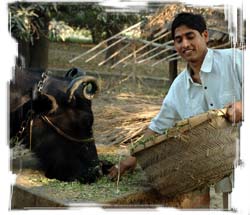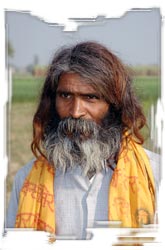CIMMYT E-News, vol 3 no. 7, July 2006
 A daring move by a young farmer in India has changed his life and his father’s.
A daring move by a young farmer in India has changed his life and his father’s.
Durgesh Kumar Singh shoulders a huge responsibility. When his father became too ill to work his small farm near Varanasi in the eastern Indo-Gangetic Plains, the 24- year-old student had little choice but to take on managing both the farm and his studies. His father was always there to give advice and share his farming knowledge, so when Durgesh decided to defy his father’s instructions, he was taking a big risk.
A team from the CIMMYT-convened Rice Wheat Consortium (RWC) for the Indo-Gangetic Plains had visited the villagers to enlist their cooperation in a demonstration of zero-till seeding technology. The team wanted village farmers to plant some of their wheat crop without plowing the soil first. Like people living on much of the vast plain below the foothills of the Himalayan Mountains, the farmers of Durgesh’s village plant wheat in the dry season, after harvesting the rainy-season rice crop. Preparing the land takes time and labor and for every day of delay after the optimal planting time, farmers lose about 1% of their potential harvest. A ten-day advance in wheat seeding results in 10% higher harvests. Plowing means waiting until a crew with a tractor and plow is available.

When the RWC team, which included Ramesh Chand and UP Singh from Banaras Hindu University, first visited the village, people laughed. “How can you expect the seed to germinate if you just throw it on the ground?” they joked. After two weeks of cajoling and pointing out that zero-tillage saves time, labor, and scarce water, the team convinced one farmer, Surindra Sharma Mayaran, to set aside a very small piece of his land for a trial. “If it works, OK, and if it doesn’t, OK,” he said. Even though the wheat germinated and grew, most villagers remained skeptical, especially Durgesh Singh’s father. He told Durgesh that he would die if his son tried to plant that way.
But seeing in that first trial a possibility for a brighter future, Durgesh decided to try zero-tillage for wheat on a small field that his father could not see from the house. He harvested at least as much as with the old methods, but gained something more precious. “We now have enough time to read,” he says. “My golden time is what I am saving.” This has not only let him continue his studies, but has reduced farm labor costs, making the family wheat crop more profitable. Now most of the villagers who were at first so skeptical are following his lead.
Even those who are nearly landless see benefits. Ram Dhari is what the village calls a “minimum landholder” with just a tenth of a hectare. He is extremely poor. He did not have the money to rent the zero-till seeding machinery, so the rest of the village let him use it for free and Banaras Hindu University provided seed. He had watched the others and wanted to follow. “I am looking forward to the profits,” he says.
This is one of countless stories of the success of a broad range of resource-conserving technologies on smallholder farms in India. RWC work, in India funded in large measure by the United States Agency for International Development (USAID), has won praise and awards. Recently the Minister of Agriculture for India, Sharad Pawar, said the use of such technologies, especially zero-tillage, was essential to the improvement of Indian agriculture.
Durgesh Singh, Ram Dhari and Surindra Mayaran see the impact in their village every day. At first Durgesh was a laughing stock. Now his zero-till fields have produced, and produced well. The father who said he would die if is son tried out such a foolish thing as planting without plowing now asks “Why didn’t you do the whole farm this way?”
For more information contact Raj Gupta (r.gupta@cgiar.org)

